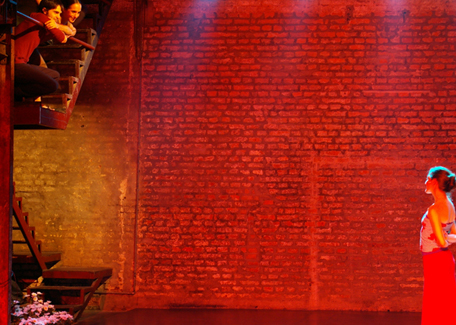DIRECTOR
> THEATRE | MUSICAL THEATRE | OPERA | SPECIAL PROJECTS
Y nada más
(2007)
Marina was born in Russia in 1892. It was a long girl, thin as a branch with light hair and green eyes. She wore bangs and liked music and words.
Marina and her family always traveled a lot. Marina's parents were busy people and also a bit distant. Her father was director of a Museum and her mother played the piano and died when Marina was a little one.
Marina studied music at the school but this did not last too long. She preferred to be alone: writing, dreaming and walking into the woods or near the river or through the mountains.
She loved the mountains, but not the sea. She wrote once: "One cannot caress the sea - is wet."
In her travels Marina learned to speak Italian, French and German. She wrote verses every day and had a personal Journal.
When she was eighteen two things happened to her: she published her first book of poetry and met a young man who liked her a lot.
The book was named Album of the afternoon. The young man’s name was Sergei.
Marina and Sergei fell in love and got married. They had a daughter and they called her Ariadne.
Meanwhile a revolution began in Russia and Sergei joined the army to fight against the revolution.
Marina and her daughter made their bags and went away from Russia. They traveled alone throgh different countries. They lived in Berlin and Prague. Later Sergei joined them. Marina and Sergei continued their studies.
Marina published more books, other poets began to know her. Some of them said she was an outstanding poet. But in Russia her books were banned.
Marina and Sergei (and Ariadne) moved to Paris where they lived many years and had other children: Irina and Georgy. Georgy had a nickname: Mur.
Marina loved her children but had troubles for feeding and sheltered them. They were a poor family, as families of writers tend to be.
They slept in hotels or in small rented rooms. They used to have hunger and cold.
One day her daughter Irina became very ill and no cure was possible. She died.
Marina cried and kept on writing. To earn more money she made some translations and wrote essays and some plays.
In those years she fell deeply in love with a German poet called Rainer and with other Russian poet called Boris.
She wrote to them very long letters. Marina loved to write letters.
She never wanted to meet Rainer in person. She preferred the words. She preferred to dream. She used to think that the body of a human being is a wall that doesn’t allow you to see its soul.
One day Ariadne and Sergei returned to Russia. And the police captured them and send them to a prisoners’ camp.
Marina returned to Russia to be close to her family. But she was forced to live in a small town, away from everything.
She didn’t get a job there. She offered herself as a glass disher in a bar.
Some poets, friends of her, sent her some money.
Soon Sergei was shot for treason. And Ariadne remained locked in the concentration camp.
One morning Marina discovered a rope that Boris, the poet had given her to tie her bags. But she would not travel anymore. She wrote a letter to her son, took the rope, hung herself from the neck and died.
The year was 1941.
Nicolás Schuff
-
Y nada más (And nothing else)
A portrait of Marina Tsvetaeva, poet (Moscow, 1892 – Yelabuga, 1941)
With texts by Boris Pasternak, Sylvia Plath, Paul Celan, Marina Tsvetaeva, Nicolás Vilela and Alejandro Tantanian. -
with
Pedro Antony
Eva Carrizo Villar
Romina Ciera
Natacha Codromaz
Estefanía Daicz
Érica D’Alessandro
Gerardo Otero
Pablo Ramírez -
Production
La Balsa de la Medusa -
Photos
Ernesto Donegana -
Graphic design
Gonzalo Martínez -
Set construction
A&B realizaciones escenográficas -
Set second assistant
María Belén Draghi -
Set and costume assistant
Cecilia Stanovnik -
Assistant director
Nicolás Vilela -
Choreography
Silvina Duna -
Lights
Marco Pastorino -
Set and costumes
Oria Puppo -
Dramaturgy, musicalization and direction
Alejandro TantanianRunning time: 55 minutes.
-
Premiere: May 26th, 2007, Espacio Callejón, Buenos Aires, Argentina
-
Further presentations:
Season 2008 at the same venue. -
